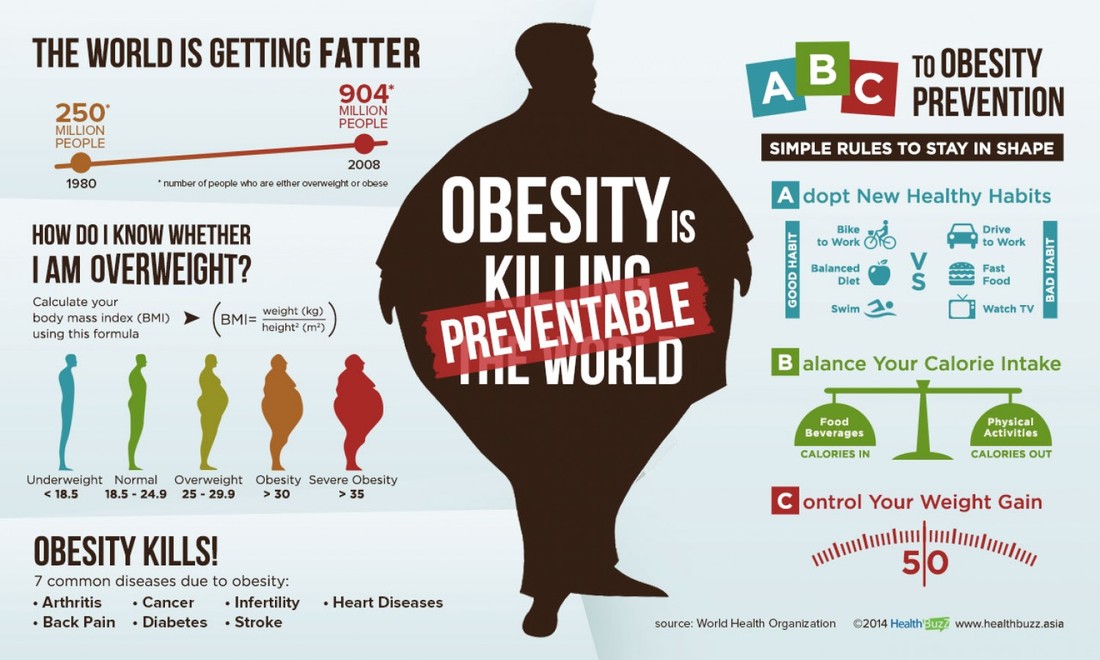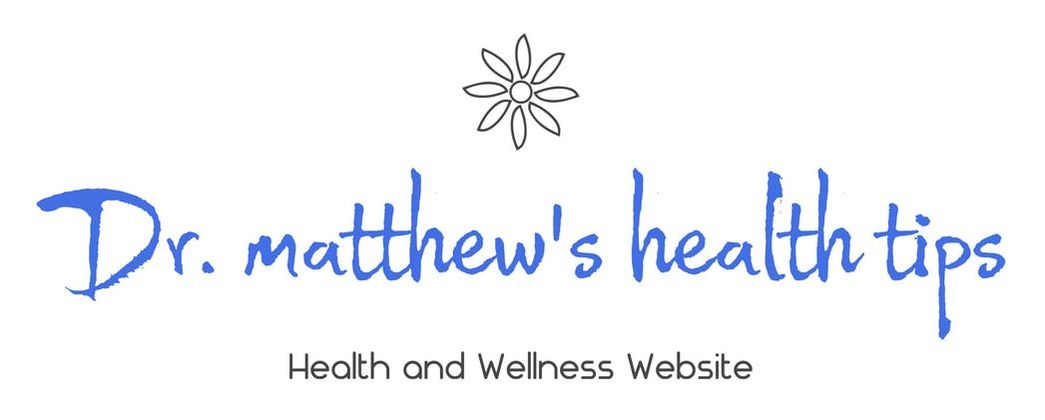|
Overweight and obesity are defined as abnormal or excessive fat accumulation that may impair health. It is a rapidly increasing pandemic with major concerns for public health. There are many ways in which a person's health in relation to their weight can be classified, but the most widely used method is body mass index (BMI). BMI is not used to conclusively diagnose obesity because people who are very muscular sometimes have a high BMI without excess fat. However, for most people, BMI is a useful indicator of obesity.
Body mass index (BMI) is a simple guide of weight-for-height that is commonly used; it is defined as a person's weight in kilograms divided by the square of his/her height in meters (kg/m2). For most adults, a BMI of:
WHO Facts 1) In 2016, more than 1.9 billion adults, 18 years and older, were overweight. Of these over 650 million were obese. 2) Worldwide obesity has nearly tripled since 1975. 3) Most of the world's population live in countries where overweight and obesity kills more people than underweight. 4) Obesity is preventable. CAUSES Obesity is generally caused by eating too much and moving too little. Diet The average physically active man needs about 2,500 calories a day to maintain a healthy weight, and the average physically active woman needs about 2,000 calories a day. Obesity develops gradually because of unhealthy eating habits such as: 1) eating large amounts of processed or fast food, 2) eating larger portions than you need, 3) drinking too many sugary drinks, and 4) drinking too much alcohol. Lack of Physical Activity Lack of physical activity has a significant influence on obesity. Many persons have jobs that involve sitting at a desk for most of the day. People rely on cars, rather than walking or cycling, and tend to watch television, and browse the Internet for entertainment. When you are not active enough, you do not use the energy provided by the food you eat, and so the excess energy you ingest is stored by the body as fat. Medical Reasons In some cases, a medical condition may contribute to weight gain, such as depression and hypothyroidism (an underactive thyroid gland). Certain medicines can contribute to weight gain as well. These include corticosteroids, antidepressants and medication to treat diabetes. Stress Stress is a part of life, and most persons will experience it to some extent. Common psychosocial stressors include poverty, stressful work environments, conflict with friends and family, poor self-esteem, trying to balance home and work life, and caring for a sick loved one. These can be chronic types of stressors, which can contribute to weight gain. Cortisol is one of the main hormones produced during stress. It is known to cause a redistribution of fat to the abdominal region. Furthermore, it can increase appetite with a preference for “comfort food”. Click on the link below to learn more about stress management. https://drmatthewshealthtips.weebly.com/blog/stress-management HEALTH CONSEQUENCES OF OBESITY People who are obese, compared to those at a healthy weight, are at increased risk for many serious diseases and health conditions. Some of these are listed below.
TREATMENT Diet To lose weight at a safe and sustainable rate of 0.5 to 1kg (1lb to 2lbs) a week, most persons are advised to reduce their energy intake by 600 calories a day. For most men, this will mean consuming no more than 1,900 calories a day, and for most women, no more than 1,400 calories a day. The best way to achieve this is to make healthier choices. A healthy diet should consist of:
EXERCISE As well as helping you maintain a healthy weight, exercise also has many other health benefits. For example, it can help prevent and manage many health conditions. It is recommended that adults should do at least 150 minutes of moderate-intensity exercise a week, for example, five 30-minute exercise sessions a week over five days. These can include, brisk walking, cycling and swimming. Alternatively, you could do 75 minutes of vigorous-intensity exercise a week, (examples include running and competitive sports like football), or a combination of moderate and vigorous activity. You should also do strength exercises and balance training two days a week. This could be in the form of a gym workout or doing an activity such as tai chi or yoga. MEDICATION Orlistat is an anti-obesity medicine that has been tested and approved to be safe and effective. Orlistat works by preventing some of the fat from the food from being absorbed. The undigested fat isn't absorbed into the body and is passed out in the stool. This will help you avoid gaining weight, but won't necessarily cause you to lose weight. Before beginning treatment with orlistat, a balanced diet and exercise program should be started and this program should continue during treatment and after you stop taking the drug. SURGERY Weight loss surgery, also called bariatric surgery, is sometimes used to treat people who are severely obese. This surgery is usually considered for persons who are obese and:
Tip#1: Calculate your BMI Knowing your BMI is a great way to monitor your weight. Oftentimes, persons are not aware that they are overweight or obese unless they have calculated their BMI. On the other hand, some persons may assume that they are overweight when in fact they are not. Calculating your BMI is easy if you use a calculator such as the one provided in the link below. All you need to know is your height and current weight. https://www.heartfoundation.org.au/your-heart/know-your-risks/healthy-weight/bmi-calculator Tip#2: Set specific and doable exercise/diet goals An example of a specific goal is to “walk 30 minutes, 5 days a week". Be realistic about your time and abilities, and ensure your goal is doable. When starting a new lifestyle, try to avoid changing too much at once; slow changes lead to success. Documenting your physical activity and meals during the day, can help you to monitor your progress. The NHS 12 week weight loss plan can be very helpful, and has excellent worksheets to help you to monitor your progress. Click on the link below for more information. https://www.nhs.uk/live-well/healthy-weight/start-the-nhs-weight-loss-plan/ Tip#3: Learn from slips Don’t worry if your job, the weather, or your family causes you to have an occasional slip, focus on continuing your eating and exercise plan. Tip#4: Celebrate your success Reward yourself as you meet your goals. Celebrate in other ways except for eating out, for example, go to see a movie, go shopping, etc. Tip#5: Involve friends and family Involving your family and friends with your weight loss efforts can help to motivate you. They can encourage you to have healthier dietary habits and may encourage you to keep your exercise goals. Tip#6: Pros and cons of different diets The best way to loose weight is to have a healthy diet. However, there are many diets that claim to cause rapid weight loss. Although many of them do work, some are better for some persons and may not work well for you. Also, there are many side effects of losing weight too quickly. Additionally, many persons tend to regain weight after trying these trendy diet plans. Below is a link to the pros and cons to some of the popular diets. https://www.nhs.uk/live-well/healthy-weight/top-diets-review/ Tip#7: Avoiding weight gain It is important to remember that as you lose weight your body needs less food (calories). If you go back to your previous calorie intake once you've lost weight, it is very likely you will put the weight back on. Increasing physical activity to up to 60 minutes a day and continuing to watch what you eat may help you to keep the weight off. Tip#8: Get Support Getting psychological support from a trained healthcare professional or therapist may also help you change the way you think about food and eating. Techniques such as cognitive behavioral therapy (CBT) can be useful. I hope these tips on Obesity were helpful; Remember, Your Health is Invaluable. By Dr. J. Lawarna Matthew Acknowledgement National Heart Lung and Blood Institute (NHLBI) https://www.nhlbi.nih.gov/health-topics/overweight-and-obesity Center for Disease Control (CDC) https://www.cdc.gov/obesity/adult/index.html Visit the links above for more information
0 Comments
Leave a Reply. |
AuthorDr. J. Lawarna Matthew Archives
January 2021
Categories |

 RSS Feed
RSS Feed
